 中文
中文
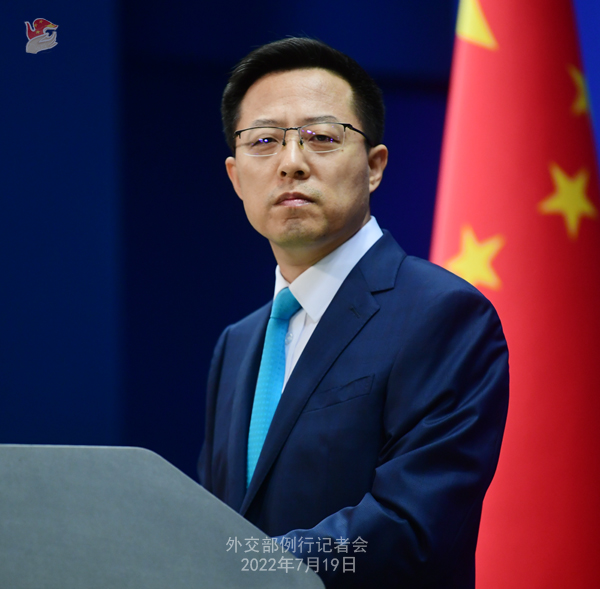
CCTV: Yesterday, the Chinese side released the information on Premier Li Keqiang’s attendance of the World Economic Forum Special Virtual Dialogue with Global Business Leaders. Could you tell us more about the program of the meeting? How many countries will the participants come from? What message will China send to global business leaders?
Zhao Lijian: The World Economic Forum (WEF) will hold the Special Virtual Dialogue with Global Business Leaders on July 19, where Premier Li Keqiang will be invited to hold dialogue and exchanges with hundreds of business leaders from over 50 countries. The dialogue will be chaired by Executive Chairman of the WEF Klaus Schwab.
At the session, Premier Li Keqiang will deliver remarks and have exchanges on issues of interest to the business community. We believe the special dialogue will help the international community get a comprehensive and accurate understanding of China's economic situation and where it’s headed, and help all parties to act in solidarity and concert to jointly address risks and challenges and promote steady economic recovery and sustainable development of the world.
Bloomberg: China has invited the leaders of four European countries, including Germany, France, Italy and Spain to meet with Chinese President Xi Jinping in Beijing in November. This is according to a report from the South China Morning Post. My question is, can you confirm that this invitation has been sent to the four leaders? And can you also confirm that the European leaders have not yet responded?
Zhao Lijian: I wonder where they got the information.
I can tell you that this is fake news.
China Daily: South Korean media citing sources within the US government reported that Washington had asked the Republic of Korea to inform it by the end of August whether it would participate in the “Chip 4” alliance. Do you have any comment?
Zhao Lijian: The chip industry is highly globalized. International division of labor has propelled sustained and rapid advancement of chip technology. The global chip industrial and supply chains, as they currently exist, are the result of the combined force of the market and the choices of businesses.
The US always claims itself to be a champion of free trade, but has time and again abused its state power to politicize, instrumentalize and weaponize sci-tech and business issues, engaged in “coercive diplomacy” and sought to forcibly relocate industries and push for decoupling. Its actions are undermining international trade rules and splitting the global market. In a highly integrated global economy, what the US has done is against the trend of the times and highly unpopular. These moves will eventually end in failure.
We hope relevant parties will stay objective and fair, approach issues in light of their own long-term interests and the market principles of fairness and equity, and do more that is conducive to stabilizing the global chip industrial and supply chains.
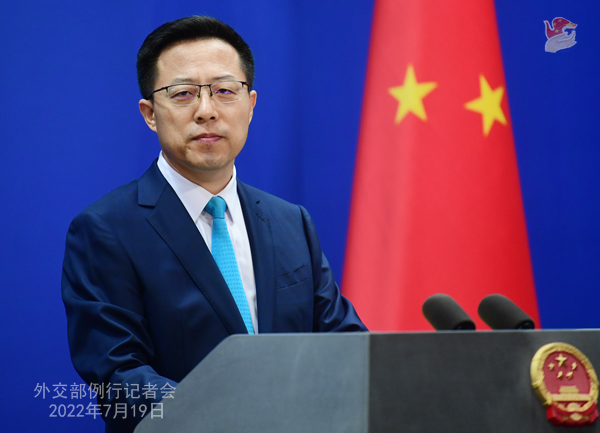
Global Times: US State Department spokesperson Ned Price said that the provision of weapons or any assistance on the part of China to help Russia evade sanctions would come with a very steep cost from the US and its allies. The US is watching very closely the implementation of sanctions on Russia and has not seen China engage in the type of actions. Do you have any comment?
Zhao Lijian: The US official sounded as if the US were the “world police”.
On the Ukraine issue, China takes an objective and fair stance and stands on the side of peace and justice. We firmly oppose any unwarranted suspicion, threat and pressure targeting China. We are also firmly against unilateral illegal sanctions and long-arm jurisdiction with no basis in international law.
As the one who started the Ukraine crisis and the biggest factor fueling it, the US needs to deeply reflect on its erroneous actions of exerting extreme pressure and fanning the flame on the Ukraine issue and stop playing up bloc confrontation and creating a new Cold War by taking advantage of the situation. The US needs to facilitate a proper settlement of the crisis in a responsible way and create the environment and conditions needed for peace talks between parties concerned.
The Hindu: Two questions on the India-China border talks that happened on Sunday. The joint press release that came out yesterday said that both sides agreed to maintain stability and to continue dialogue. But it seems there still hasn’t been a breakthrough. Can you share some details as to what’s the reason for this continuing stalemate and is China willing to discuss disengagement in all the remaining friction areas along the LAC? Secondly, there were reports in the Indian media that India had lodged a protest over Chinese aircraft that were flying close to contested border areas. I was just wondering if you had a response to those reports.
Zhao Lijian: On your first question, during the 16th round China-India Corps Commander Level Meeting, building on the progress made at the last meeting on March 11, 2022, the two sides continued discussions for the resolution of the relevant issues along the LAC in the Western Sector in a constructive and forward-looking manner. They had a candid and in-depth exchange of views in this regard, in keeping with the guidance provided by the State Leaders to work for the resolution of the remaining issues at the earliest. The two sides agreed to maintain the security and stability on the ground in the Western Sector. The two sides agreed to stay in close contact and maintain dialogue through military and diplomatic channels and work out a mutually acceptable resolution of the remaining issues at the earliest. A joint press release was issued by both sides which commented positively on the meeting.
On your second question, I do not have information about the specific question you raised. I want to stress that China always conducts normal activities in the border areas in accordance with relevant agreements signed between China and India. In the meantime, we always ask the Indian side to abide by these agreements.
China News Service: According to reports, the US Space Force recently activated the National Space Intelligence Center. Some commented that it reflects the US strategic ambition to “outreach and win” in the space domain and that it may intensify the trend of expanding arms race to space, putting humanity’s overall stability at risk. What’s your comment on this?
Zhao Lijian: Space is a global public sphere and a key factor in humanity’s security and wellbeing. Preventing space arms race is an important prerequisite for ensuring peace, tranquility and sustainable use of outer space.
The US is the main driver in turning outer space into a weapon and a battlefield. It has long pursued a strategy for dominance in space and openly defined outer space as a war-fighting domain. To achieve its strategy, the US has been aggressively developing and deploying a variety of offensive outer space weapons such as directed energy and Counter Communications System, frequently holding military drills and advancing all-round military buildup and preparedness in outer space. The US has engaged in intelligence theft and close-in reconnaissance in the space domain, just as it has done in other domains. This would bring a serious negative impact on global strategic stability and constitute grave threats to peace and security in outer space.
The US should behave responsibly in outer space, stop fueling the militarization and weaponization of outer space, and earnestly undertake its due responsibility of safeguarding peace and stability in outer space.
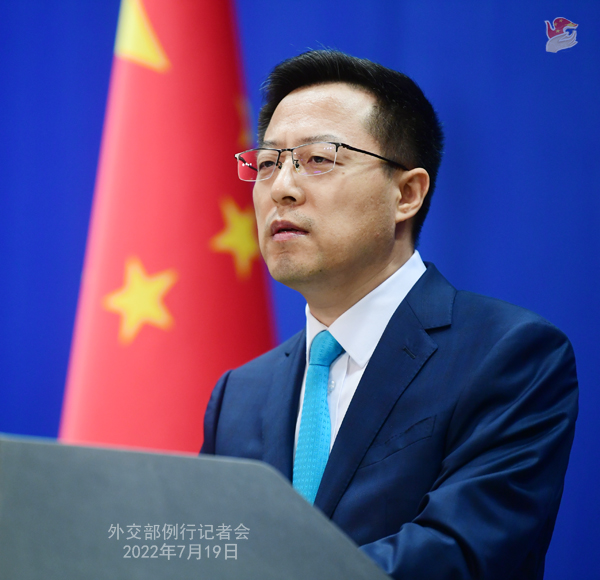
Reuters: Financial Times reported that US House Speaker Nancy Pelosi plans to visit Taiwan next month. How do you comment about this?
Zhao Lijian: The Chinese side has repeatedly stated its stern position on this. We firmly oppose any form of official interaction between the US and the Taiwan region. The US Congress is part of the US government and supposed to strictly adhere to the US’s one-China policy. If Speaker Pelosi visits Taiwan, it would seriously violate the one-China principle and the stipulations in the three China-US joint communiqués and harm China’s sovereignty and territorial integrity. It will have a severe negative impact on the political foundation of China-US relations, and send a gravely wrong signal to “Taiwan independence” separatist forces. China firmly opposes such a visit.
We urge the US side to adhere to the one-China principle and the stipulations in the three China-US joint communiqués. The US must not arrange for Speaker Pelosi to visit the Taiwan region and must stop official interactions with Taiwan, stop creating factors that could lead to tensions in the Taiwan Strait, and follow through on the US’s commitment of not supporting “Taiwan independence”. Should the US side insist on doing otherwise, China will take strong and resolute measures to safeguard its sovereignty and territorial integrity. The US must assume full responsibility for any ensuing consequences.
Xinhua News Agency: It is reported that US State Department spokesperson Ned Price said during his briefing that the US has “obligations under the Taiwan Relations Act” to “make available to Taiwan defense articles and services necessary to enable Taiwan to maintain a sufficient self-defense capability”, adding that this is “entirely consistent with our ‘one China’ policy”. Do you have any comment?
Zhao Lijian: Yesterday, we made clear China’s stern position on the US’s latest proposed arms sale to Taiwan. I must reiterate that China firmly opposes and strongly condemns this. We have made serious demarchés to the US side over this.
The so-called “Taiwan Relations Act” is a domestic legislation unilaterally adopted by the US. It seriously breaches widely recognized international laws and basic norms in international relations and runs counter to the one-China principle and the stipulations in the three China-US joint communiqués. China has never recognized the Act and has always rejected it. A domestic law like this is no justification or rationale for the US to brazenly interfere in China’s internal affairs and sell arms to Taiwan.
Be it the one-China principle or the one-China policy, both terms have “one China” at their core. Acknowledging that Taiwan is part of China is a solemn commitment made by the US in the three China-US joint communiqués. US arms sales to Taiwan gravely violate the one-China principle and the stipulations in the three China-US joint communiqués, embolden the “Taiwan independence” separatist forces, and escalate tensions across the Taiwan Strait. The US side needs to immediately stop arms sales to and military contact with Taiwan, stop creating factors that could lead to tensions in the Taiwan Strait, and follow through on the US government statement of not supporting “Taiwan independence”.
People’s Daily: Australian Foreign Minister Penny Wong touched on Australia-China relations in a recent interview saying that “it’s in the interest of both nations for the relationship to be stabilized and if both parties wish to do that, then there’s a way forward.” She added that the four-point plan put out by China are “reasonably unsurprising” and that “We will deal with China diplomatically and in a considered way.” What is China’s comment?
Zhao Lijian: China has noted the positive elements of the statement of the Australian side.
The sound and steady development of China-Australia relations meets the common interests of the two countries and the two peoples. It is also good for safeguarding peace, stability, development and prosperity in the Asia-Pacific. China-Australia relations are presented with both challenges and opportunities. We hope the Australian side can seize the opportunities, shape up a right perception of China, stay committed to seeking common ground while putting differences aside when getting along with China, and take concrete actions to build more positive dynamics for developing bilateral relations. China is ready to act in the spirit of mutual respect, work together with the Australian side and advance bilateral relations along the track of comprehensive strategic partnership for steady development and for the benefit of the two peoples.
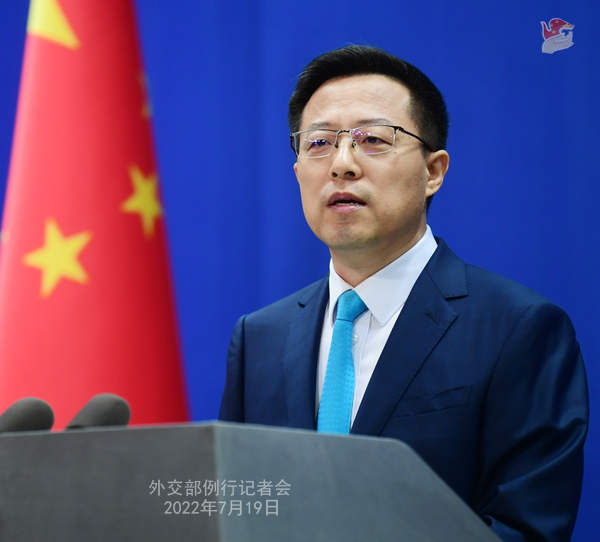
Hubei Media Group: According to reports, the Tokyo Electric Power Company (TEPCO) has basically completed the construction of an undersea tunnel outlet to dump the nuclear-contaminated water. The Nuclear Regulation Authority (NRA) of Japan may officially approve TEPCO’s discharge plan as soon as this month. For more than a year, Japan’s ocean discharge decision has met strong opposition from Fukushima Prefectural Federation of Fisheries Cooperative Associations, Japan’s national federation of fisheries cooperatives and the international community. What is China’s comment?
Zhao Lijian: China has noted the reports you mentioned. We are deeply concerned. We also noted that countries voiced strong concerns at the recent Pacific Islands Forum Leaders Meeting, after they had done so a week ago at the PIF foreign ministers meeting. They reaffirmed the importance of ensuring international consultation, international law, and independent and verifiable scientific assessments. Their appeal is shared by China and other littoral states of the Pacific.
More than a year has passed and the Japanese government and TEPCO still haven’t offered full and convincing explanation on issues like the legitimacy of the discharge plan, the reliability of data on the nuclear-contaminated water, the efficacy of the treatment system or the uncertainty of environmental impact. Though the IAEA has yet to complete a comprehensive review, the Japanese side has been pushing through the approval process for its ocean discharge plan and even started building facilities for the discharge. It is rather irresponsible for Japan to have acted against the public opinion at home and concerns abroad.
As the Japanese side faces mounting opposition to its behavior, we urge Japan not to cover up its ears, but instead seriously heed the voices of the international community, revoke the wrong decision of dumping nuclear-contaminated water into the ocean, and comprehensively assess the options available for handling the contaminated water. Japan must not discharge the contaminated water into the ocean before consensus is reached with stakeholders and international agencies through full consultation. This is a litmus test of Japan’s commitment to international obligations.
NHK: Former US Defense Secretary paid a visit to Taiwan and met with Tsai Ing-wen. He said that Washington’s one-China policy has “outlived its usefulness” and it is time for the Biden administration to review the “strategic ambiguity” on issues relating to security across the Taiwan Strait. Do you have any comment?
Zhao Lijian: The one-China principle is the political foundation of China-US relations and an established international consensus. China firmly opposes the attempt by any force or individual to play the “Taiwan card”, interfere in China’s internal affairs and undermine China’s core interests.
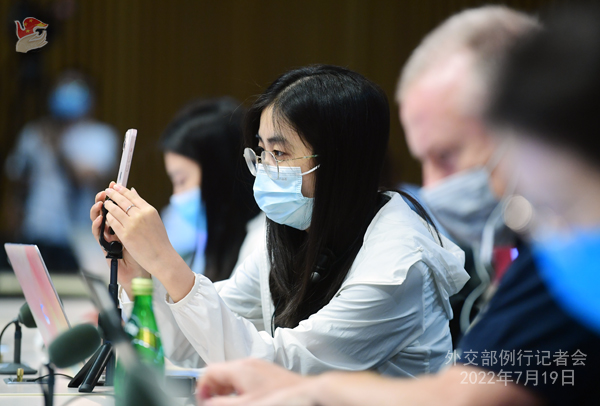
AFP: The European Parliament Vice President Nicola Beer is visiting Taiwan this week. She said today that Europe must stand firm with Taiwan and avoid turning a blind eye to the mainland’s threats to Taiwan. Do you have any response to these comments?
Zhao Lijian: Taiwan is an inalienable part of China’s territory. The one-China principle is a widely recognized basic norm in international relations and the political foundation of China-Europe relations. The European Parliament is an official institution of the European Union. Hence its members and senior officials are expected to abide by the one-China principle.
Over the past two years, the European Parliament has promulgated multiple Taiwan-related resolutions to support and embolden “Taiwan independence” forces. Such moves have gravely violated the one-China principle and poisoned the atmosphere of China-Europe relations. China firmly opposes all forms of official interactions between the EU side and the Taiwan region. We urge the EU side to earnestly abide by the one-China principle, speak and act with prudence on issues related to Taiwan, and prevent any serious disruption in China-Europe relations.
AFP: The Director of the US Agency for International Development Samantha Power, said yesterday that China is partly to blame for famine in the Horn of Africa due to Chinese trade restrictions on fertilizer and hoarding of grain. Do you have any response to these criticisms?
Zhao Lijian: As a developing country, China has no obligation to provide official development assistance (ODA). However, as the second largest contributor to the UN regular budget and a responsible major country, China has been actively participating in international development cooperation, providing substantial development resources to UN development agencies, including food and agriculture agencies, and making positive contributions to global food security. Food security is included as one of the eight priority areas of cooperation in the Global Development Initiative put forward by China. Since COVID-19 began, China has responded actively to the initiatives of the UN and other international organizations to provide emergency food aid to a host of countries. China has provided more funding, sent more experts and undertaken more projects under the framework of the Food and Agriculture Organization’s South-South Cooperation Programme than any other developing country.
It is quite clear to the world who exactly is causing the global food crisis. The US side also admitted that the sanctioning of Russia has taken a toll on many countries and made food shortages a reality. An article on German-foreign-policy.com wrote that the soaring food price may trigger a hunger riot in the Arab world which could lead to political turbulence. The US still has not returned to the Afghan people their hard-earned money. Now how many Afghan lives will face the risk of starvation because of that? We hope that the US will seriously reflect on its disreputable role in the global food crisis and stop smearing and making groundless accusations against China.